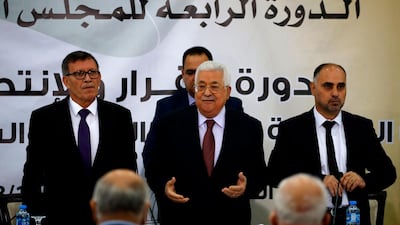Fuel started to enter Gaza again through the Erez crossing earlier this month in a deal brokered by the United Nations and backed by the United States, Israel and others. But there was one party missing: the Palestinian Authority.
Israel stopped the shipments within days, saying they would only resume if Gaza’s rulers Hamas curbed weekly border protests that have been ongoing since March. Those deliveries were set to resume on Wednesday. The efforts were part of the UN-backed efforts to ease the humanitarian crisis in the coastal enclave.
It marked the first time since 2007 that aid was sent directly to Gaza without the supervision of the PA, sent with Israeli co-ordination and agreed with full American blessing. That is why this endeavour had many Palestinian observers casting doubts on whether there is a hidden motive behind it.
Certain Palestinian officials and analysts believe that bypassing the PA is part of the long-held Israeli plan to maintain the separation of the Gaza Strip from the West Bank and East Jerusalem and terminate whatever is left of chances for the Palestinian statehood project.
In violation of the Oslo Accords signed between Israel and the PLO, which stated that the "two sides view the West Bank and the Gaza Strip as a single territorial unit", Israel did all it could, over the years, to separate Gaza from the West Bank and treat them as two separate entities. Some view the initiative to funnel aid directly to Gaza and the exclusion of the PA as a new episode of the Israeli plan to maintain the separation.
"Israel wants to keep Hamas in power in Gaza for no reason except to terminate the dream of a Palestinian state, but Hamas doesn't see that because it is blinded by their greed to get their share of the cake," former Hamas member Khader Mihjiz told The National.
“Israel is playing on Hamas’s easy-to-expect behaviour, which is that when Hamas leaders feel a bit empowered, they turn away from the intra-Palestinian reconciliation,” he added.

The PA, led by President Mahmoud Abbas, is wary of Donald Trump’s so-called “deal of the century”, believed by the Palestinians to be designed to liquidate all their claims and rights. They include Jerusalem, then the refugees’ right of return, and the Palestinians’ right to land beyond the pre-1967 borders, with the Trump administration refusing to condemn Israel’s illegal settlement building in East Jerusalem and the West Bank.
PA officials say that a major part of Mr Trump’s planned deal is to separate Gaza from the West Bank. They consider any attempts by Hamas to strike a deal on a humanitarian solution outside the PLO umbrella to be a treasonous move.
The PA is also concerned about reducing the Palestinian cause to the humanitarian aspect and offering apolitical solutions to the Palestinians. Senior PA official Mohammad Shtayyeh reportedly told UN envoy Nickolay Mladenov, who was involved in the efforts to send aid to Gaza directly, that “man shall not live by bread alone”.
The PLO Executive Committee recently refused to meet Mr Mladenov because he, the committee said, crossed the limits of his role in trying to co-ordinate a deal between Israel and Hamas.
_________
Read more:
Gaza swim team braves polluted waters in pursuit of Olympic dream
West Bank village braces for another two-state death blow
Hamas leader says won’t stop Gaza marches for ‘diesel fuel and dollars’
_________
Over the past two months, Hamas and Israel have been engaged in truce talks to get Hamas to end the March of Return protests in return for alleviating the blockade on Gaza. But the PA strongly opposed the talks, saying that only the PLO has the legitimacy to negotiate on behalf of the Palestinian people and that a unilateral deal with Hamas will perpetuate the separation.
PA officials exerted pressure on both Hamas and Egypt to prioritise the Palestinian reconciliation talks over the truce talks. They also said that if the consensus government were allowed to assume control of the Gaza Strip, a truce and ending the siege would happen automatically.
But, as the reconciliation dossier continues to prove almost impossible to achieve, Hamas was eventually told by different foreign parties that Mr Abbas will be bypassed and that aid will be sent to Gaza directly, according to senior Hamas leader Mousa Abu Marzouk.
Saeb Erekat, secretary general of the PLO Executive Committee, called on Hamas to “realise that the issue now is bigger than internal partisan political squabbles and bigger than scoring political points. The issue now has to do with stopping schemes designed to liquidate the foundations of the Palestinian cause”.
Mr Erekat cited that in 2014, when he and Majid Faraj were in negotiations with the Israeli team, suddenly the Israelis suspended the negotiations because they learnt that the PA had signed Al Shati agreement with Hamas.
Benjamin Netanyahu, the Prime Minister of Israel, said at the time that the PA can choose either the peace negotiations with Israel or the agreement with Hamas. Mr Abbas said that “it is necessary to achieve reconciliation with Hamas and achieve political partnership because there can be no state without the Gaza Strip nor a state in Gaza”, Mr Erekat recalled. He said it is time for Hamas to do the same and favour Palestinian reconciliation over the negotiations with Israel.
Hamas leaders now adopt the position that the reconciliation will only succeed after Mr Abbas is out of the picture. Such rhetoric that Mr Erekat has warned of coincides with the words of Mr Trump’s pro-Israeli advisers Jared Kushner, Jason Greenblatt and David Friedman, who have said they will negotiate with Mr Abbas’s successor.
Israeli military intelligence website Debka said that sending aid directly to Gaza and not through the PA for the first time is part of the US administration’s "peace" plan to eventually separate the Gaza Strip from the West Bank to form two separate Palestinian entities.
"None of the humanitarian gestures presented through Israel or any country will end the suffering of the Palestinian people in Gaza," Jihad Harb, a political analyst in Gaza, told The National.
“The appropriate solution for Gaza will come only through Palestinian unity,” he says, “which will radically improve Gaza's economic depression and save the Palestinian national project.”

